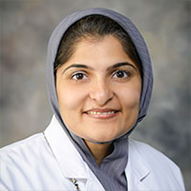22q Deletion Syndrome (DiGeorge Syndrome, VCFS)
The 22q Team Program at Children’s Health℠ is the first of its kind in North Texas, providing multidisciplinary care to patients with 22q Deletion Syndrome (DiGeorge Syndrome, VCFS).
What is 22q Deletion Syndrome (DiGeorge Syndrome, VCFS)?
22q11.2 deletion syndrome, or 22q, alternatively known as DiGeorge syndrome (DGS) and VeloCardiofacial syndrome (VCFS), is caused by a chromosome abnormality. All 22q deletion (DiGeorge syndrome, VCFS) patients have a small missing piece in one copy of chromosome number 22. This missing piece includes an estimated 30 to 40 genes. Missing a section of chromosome 22 has the potential to affect many parts of the body and can cause a wide range of health problems, so individuals with 22q deletion (DiGeorge syndrome, VCFS) may experience different symptoms.
What are the signs and symptoms of 22q Deletion Syndrome (DiGeorge Syndrome, VCFS)?
- Distinctive facial appearance, including an underdeveloped chin, heavy-lidded eyes and ears that are rotated back and low-set.
- Heart defects – Defects usually involve the aorta and the part of the heart from which the aorta develops. In some patients, heart defects may be mild or absent.
- Parathyroid gland abnormalities – The parathyroids control the normal metabolism of calcium and phosphorus. These glands may be underdeveloped in patients with 22q deletion syndrome (DiGeorge syndrome, VCFS), causing hypoparathyroidism. People with 22q deletion syndrome (DiGeorge syndrome, VCFS) may have trouble maintaining normal levels of calcium, and this may cause seizures.
- Short stature – Certain children with 22q deletion syndrome (DiGeorge syndrome, VCFS) may be deficient in growth hormone, which can present with short stature or growth failure.
- Speech and feeding – Patients with 22q deletion syndrome (DiGeorge syndrome, VCFS) may have a cleft palate or poor function of the palate resulting in speech differences, delayed speech and difficulty feeding and swallowing.
- Developmental and behavioral challenges – Not uncommonly, patients may have learning differences, behavioral problems, hyperactivity and psychiatric disorders, including anxiety and schizophrenia.
- Thymus gland abnormalities – The thymus is critical in the development of the immune system. Patients with a small thymus produce fewer T-lymphocytes than those with a normally sized thymus. The T-lymphocyte defect varies from patient to patient. In a very small number of patients with 22q deletion syndrome (DiGeorge Syndrome, VCFS), the thymus is completely absent, so patients are more susceptible to infection due to low T-cell count. The majority of patients with 22q deletion syndrome (DiGeorge syndrome, VCFS) have less severe or mild deficiencies.
- Thyroid gland abnormalities – The thyroid gland makes a hormone (chemical in the blood) important to normal brain development for babies and important for a child’s energy levels and metabolism as a child gets older. Thyroid levels can be too high or too low in children with 22q deletion syndrome (DiGeorge syndrome, VCFS).
How is 22q Deletion Syndrome (DiGeorge Syndrome, VCFS) diagnosed?
If your child’s doctor suspects 22q deletion syndrome (DiGeorge syndrome, VCFS), due to a combination of the above symptoms or a heart defect, he or she will order a blood test that can detect a deletion in chromosome 22. What it can’t predict is the specific long-term effects of that change. Children’s Health provides a combination of clinical assessments and lab tests so we can confirm the chromosomal differences, offer a diagnosis and begin to identify which symptoms present themselves.
What causes 22q Deletion Syndrome (DiGeorge Syndrome, VCFS)?
The deletion of genes from chromosome 22 usually occurs as a random event in the father's sperm or in the mother's egg. The deletion can be an inherited condition passed to a child from a parent who also has it, but who is only mildly affected.
How is 22q Deletion Syndrome (DiGeorge Syndrome, VCFS) treated?
Although there is no cure for 22q deletion syndrome (DiGeorge syndrome, VCFS), the treatments below can help manage the problems associated with it.
Early childhood intervention programs are very important. Children should have formal speech, occupational and physical therapy evaluations.
- Heart defects can be addressed by cardiac surgeries, and your child will then follow up with the cardiologist on a regular basis.
- Cleft palate surgery may be an option to help with hypernasality in speech or velopharyngeal incompetence.
- T-cell deficiency may or may not require treatment. Recommendations may be provided on how to protect your child from infectious exposures, and treatments may include antibiotics and/or immunoglobulin therapy to prevent infections.
- Your child may be treated with thyroid or calcium and vitamin D supplements if levels are found to be off.
- Assistance with feeding including bottles with specialty nipples.
- Hearing should be checked regularly since hearing loss due to a buildup of fluid behind the eardrums is common. Ventilation tubes may be necessary to help fluid drain out across the eardrum.
22q Deletion Syndrome (DiGeorge Syndrome, VCFS) Doctors and Providers
-
 Alex Kane, MD Plastic and Craniofacial Surgeon
Alex Kane, MD Plastic and Craniofacial Surgeon -
 Perrin White, MD Pediatric Endocrinologist
Perrin White, MD Pediatric Endocrinologist -
 Soumya Adhikari, MD Pediatric Endocrinologist
Soumya Adhikari, MD Pediatric Endocrinologist -
 Abha Choudhary, MD Pediatric Endocrinologist
Abha Choudhary, MD Pediatric Endocrinologist -
 Melissa Ham, MD Pediatric Endocrinologist
Melissa Ham, MD Pediatric Endocrinologist -
 Sadia Malik, MD Pediatric Cardiologist
Sadia Malik, MD Pediatric Cardiologist -
 Muniza Mogri, MD Pediatric Endocrinologist
Muniza Mogri, MD Pediatric Endocrinologist -
 Sudha Mootha, MD Pediatric Endocrinologist
Sudha Mootha, MD Pediatric Endocrinologist -
 Nivedita Patni, MD Pediatric Endocrinologist
Nivedita Patni, MD Pediatric Endocrinologist -
 James Seaward, MD Plastic and Craniofacial Surgeon
James Seaward, MD Plastic and Craniofacial Surgeon -
 Amanda Shaw, MD Pediatric Endocrinologist
Amanda Shaw, MD Pediatric Endocrinologist -
 Christian Wysocki, MD Pediatric Immunologist
Christian Wysocki, MD Pediatric Immunologist -
 Ming Yang, MD Pediatric Endocrinologist
Ming Yang, MD Pediatric Endocrinologist -
 Veronica Edgar, PhD, ABPP Pediatric Neuropsychologist
Veronica Edgar, PhD, ABPP Pediatric Neuropsychologist -
 Huay-Lin Lo, MD Pediatric Endocrinologist
Huay-Lin Lo, MD Pediatric Endocrinologist -
 Angela Scheuerle, MD Pediatric Genetics Specialist
Angela Scheuerle, MD Pediatric Genetics Specialist
Frequently Asked Questions
-
How common is 22q deletion syndrome?
22q deletion syndrome (DiGeorge syndrome, VCFS) is the most common microdeletion syndrome. It occurs in approximately one in every 4,000 people.
-
What is the outlook for children with 22q deletion syndrome?
The outlook for children with 22q deletion syndrome (DiGeorge syndrome, VCFS) depends on the function of each affected organ system. The severity of heart disease is usually the most important determining factor. Most children have a mild to moderate deficit in T-cell production that often improves with age. Most patients do not have recurrent infections in adulthood.
Developmental delay, learning differences and problems with attention and behavior are common. Early childhood intervention, speech, occupational therapy and physical therapies can be very helpful.
Neurocognitive evaluation as children get older and in school can assist parents and teachers by providing recommendations for clinical management and academic support in the future.
-
Where can I find a 22q deletion syndrome support group?
We will provide you with resources to help both you and your child. The resources below are also a good source for more information about 22q deletion syndrome (DiGeorge syndrome, VCFS) and support groups.